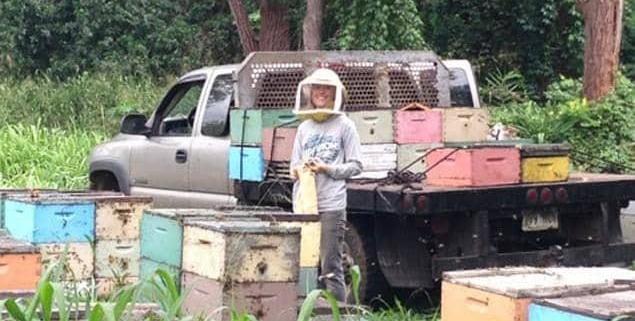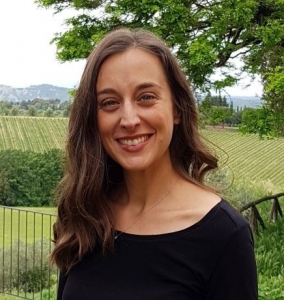Beekeeping Made Simple Interview with Laryssa Kwoczak
When you’re new to beekeeping there’s so much to learn, it can be intimidating knowing where to start. And, even when you get some experience behind you and you think you know something, you realize that the new swarm you just got doesn’t plan on following any of the rules in any of the books you’ve read.
I recently had the pleasure of chatting with Laryssa Kwoczak of Beekeeping Made Simple who has created a whole beekeeping course especially to help people get started keeping bees. She has distilled her 10 years of experience into a video course that walks you through (and lets you re-watch) what you need to know along with her own tips and tricks. We talked about how she got into beekeeping, how she almost gave up, and her advice for getting started.
Where are you from?
I grew up in Philadelphia, but now I live in Hawaii.
That’s a pretty big change of scenery, isn’t it?
Yeah it is! I happened to go on a trip to Hawaii to help deal with some burn-out from my job as a graphic designer, and I really loved it. It was just the complete opposite of Philadelphia. Here on the big island it’s very rural and it was the first time I felt surrounded by nature that was not suffering. Everything was just alive and thriving. When I got back home, I heard about these opportunities to go stay on a farm and do a work trade. So I found a bee farm in Hawaii that had a 6 month internship and after an interview in December they asked if I could come in February. So I said ‘ok’, packed up my stuff, and went back to Hawaii.
How long have you been a beekeeper?
I’ve been a beekeeper for about 10 years. I worked for an organic bee farm for seven years. They had given me a swarm that moved into a hive and from there I just started doing things like recovering swarms and doing cutouts, and I started building my apiary that way.
What fascinates you most about bees?
I would say the queen. I read the book ‘Honeybee Democracy’ by Thomas Seeley and I was just impressed by how they communicate and what the queen’s role is and how she gets thrown out when she’s not doing her job. Also the dynamic of how everything works together. There are no egos, everyone has a job and they all just switch when it’s time and I just love how their system works so well. They pass information down from one generation to the next, and I think that’s really fascinating.
How did you get started beekeeping?
I went to an aquaponics farm in Philly with my friend and she pointed out that they had beehives, that they were always sold out of honey, and suggested that we should have bees. And I actually didn’t think you were legally allowed to keep bees without some kind of training. I didn’t think you could just go buy some bees and do it, but apparently you could. So we started doing some research. I was fascinated by it and just kept reading more and more and spent a lot of time in the library reading stacks of books about bees. And a few months later I had made a beehive with my dad, ordered some bees, and we just tried it.
Our first year we put one hive in and they absconded after one week. The next summer we had 2 hives and got 2 packages of bees and they both stayed. And then they both died over the winter.
What inspired you to create a course for beekeepers?
After my second year I was going to give up because I just didn’t really know how to do it properly. I almost gave up, but I found somebody to help me and I’m glad I did. One thing that I hope will help is telling people about how I failed at the beginning. I ended up having to do a lot of research to figure out what was going wrong.
Everyone’s gonna fail at some point, but I hope people don’t get discouraged by the failures if they really love it. That’s really the purpose of this class. I really want to help those people who feel like they’re failing.
It’s important to keep trying and find a community that will help you figure out the technical stuff especially if beekeeping is something that you’re interested in and you’re fascinated by bees or nature. Classes are there to help you. I want my students to be able to feel comfortable about asking whatever questions they need to.
What other projects have you got in the works for Beekeeping Made Simple?
At the moment, I’m working on filming more videos for the YouTube channel and adding to my line of beekeeping apparel. However, I’d like to start filming a more advanced beekeeping class that teaches people about queen breeding as well as ways you can generate an income from keeping bees.
Can I ask if there was something specific that prompted you to get involved with Beekeeping for Veterans?
I like helping people get started doing something they don’t know how to do. But personally, my grandfather was a veteran and my brother-in-law was a first responder after 9/11. And I’m just having fun keeping bees, so if I can do something that helps people who risk their lives and are suffering because of it, then I’m happy to help.
What is something that most people don’t know about beekeeping?
Well, I think it’s necessary to tell people that you’re gonna kill some bees. You’re gonna get stung. I also warn people that there’s no one way to do things. Even after 10 years I still see things that make me say “I have no idea! I don’t know what’s going on.”
You have to accept that sometimes the best thing to do is to do nothing. It’s nature, there are so many variables, you can’t control it, and not every hive is the same. So if you want everything to be perfect, then this isn’t the hobby for you. Beekeeping is a little wacky and you have to be prepared.
I start every chapter in the course with a quote and in the first chapter I have,
“My first year I thought I knew everything and every single year since, I’ve realized that I know less and less and less.”
Anyone who thinks that they know everything about beekeeping is someone that you should not be talking to about beekeeping. So those are the big warnings that I try to give people.
What ‘Life Lessons from the Hive’ have you picked up from working with bees?
I feel like they just really keep me in check to be present in what I’m doing. Sometimes I get a little too caught up in all the other stuff I’m ‘supposed’ to be doing. When you’re out with the bees it forces you to zone in to what you’re doing and not think about everything else. Having something that helps you forget about everything else in the world is helpful and when you open a beehive you don’t have the option to not be focused. Well, you do, but if you’re not focused you should just close up the hive and walk away!
If I’m not focusing on what I’m doing and not present, they remind me pretty quickly to pay attention. Being in the present is not only what the bees taught me but they force me to continue with, which is the best part. It’s a constant exercise.
[spacer height=”20px”]
The more I talk to other beekeepers, the more I hear stories of these odd series of events that at some point led us all to think “Yeah, I’m gonna get some bees and try this thing out. I think it’ll be fun.” And that’s where the journey begins. As Laryssa mentioned during our conversation, “sometimes it seems like things just happen and it’s not really in your control. You can go against it if you want to but I’ve always thought the best thing to do is let the universe lead you to certain things that you should be doing.”
We’ve all been led to beekeeping by one way or another, and we’re all spellbound by these fascinating little creatures that seem to be able to create way more than just honey, propolis and wax. It seems they’re capable of creating opportunities, relationships, and experiences for us that we never even knew existed.
Laura Markus
Laura Markus is a blogger and beekeeper based in Italy, but originally from the U.S. She is fascinated by all things bees, but mostly by how they communicate. When she’s not hanging out at the hives she is also an English Teacher and Fluency Coach for non-native English speakers.




Leave a Reply
Want to join the discussion?Feel free to contribute!